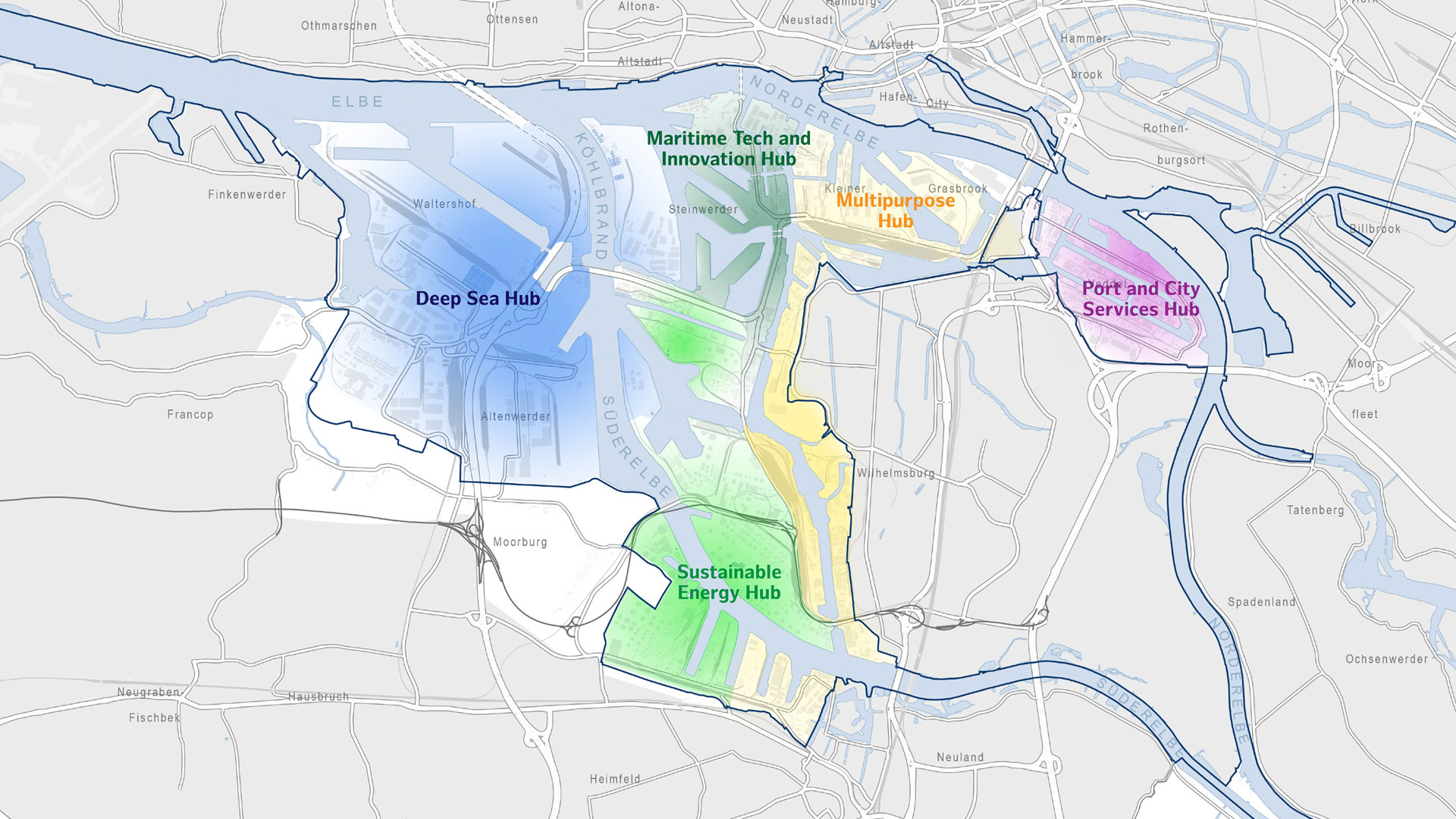Three new projects for ‘green’ ports
Port of Hamburg Marketing is involved in three European projects to promote the decarbonisation of ports.

PoHM: In the new port development plan, sustainability and climate protection are among the leitmotifs. How important are these two?
Dr Melanie Leonhard: Transporting cargo by sea is one of the least-polluting modes of transport – one ship sailing to Hamburg replaces many hundreds, if not thousands, of truck journeys. We not only have good conditions, we also have ambitious goals. Sustainability and climate protection are therefore high priorities in the new port development plan: Our goal is to make port operations climate-neutral by 2040. This is not just about extending Hamburg's climate targets to the entire city state, including the port: It is about making climate protection a relevant business factor for all players in the maritime industry and global logistics. It is foreseeable that CO2 emission rights will become considerably more expensive in the coming years. As a result, those with a smaller carbon footprint will have a commercial advantage. In addition, investors, lenders and customers are increasingly focusing their decisions on sustainability and climate compatibility. This means that the implementation of climate protection measures and the path to carbon neutrality are also a business case, which will allow us to exploit the strengths of the port even more in the future.
Germany wants to become less dependent on individual countries when it comes to importing energy resources. In addition, a lot of raw materials have to come to Germany. This makes the ports an important transhipment hub. What activities can the Port of Hamburg undertake?
The port plays an important role in strengthening sustainable technologies and energy sources. To secure energy supply, especially for industry, we will need sources other than fossil fuels. This role can be taken on by hydrogen and its derivatives, which will become more and more important in the future. In regions where a lot of energy is generated from renewable sources, hydrogen can be produced and transported to us. Import terminals in ports play an important role in ensuring supply security in Germany: As part of our hydrogen import strategy, a number of import terminals have already been announced. In addition, the interface to the HyPerLink I hydrogen pipeline should be ready in the next few years. Together with the interface to HyPerLink III, this will offer enormous potential for hydrogen imports from Denmark.
„Transporting cargo
by sea is one of
the least-polluting
modes of transport."
What are the opportunities beyond transhipment?
Besides importing renewable energy, it can also be produced in the port, for example by wind farms and photovoltaic systems on roofs and warehouses. In addition to this role, the Port of Hamburg will continue to play a key role as a strategic hub for the whole of northern Germany, thanks to its excellent location and good rail infrastructure. It will also play an important role as a multi-purpose port and industrial location, not only for transhipment, but also for production, processing and as a logistics hub. Additionally, a central electrolysis plant is being developed on the site of the decommissioned Moorburg coal-fired power station, right in the middle of the Port of Hamburg and the industrial zone, with an initial capacity of 100 MW and the potential for up to 800 MW in the future.
What energy resources is the Port of Hamburg already prepared for?
Hamburg has a long tradition in handling energy resources, historically centered around fossil fuels.We can draw on this experience and have a well-developed infrastructure that can be repurposed for diverse energy sources. This encompasses well-established terminals and pipeline systems. We want to use and build on this solid foundation.
Can you give us a specific example?
In 2022, Air Products and Mabanaft established a partnership to build a modern green energy import terminal in Hamburg. This terminal will be located at Mabanaft's existing tank farm starting in 2026. It is an important step towards green ammonia as a future energy source and as a suitable carrier for the import of green hydrogen. The liquid ammonia, which has a particularly high hydrogen storage capacity, will be transported to the Port of Hamburg, where the terminal infrastructure will be adapted and expanded. In addition, Evos Hamburg and the Lother Group are working together as part of the 'Hamburg Blue Hub' to set up facilities for the import and storage of e-methanol, e-fuels, HVO and e-diesel on the premises of Evos Hamburg from 2026 onwards. This will help establish Hamburg as Europe's central distribution hub. For the port itself, the new forms of energy will play a role, for example in ship bunkering.
You mentioned the 100 MW electrolyser on the former Moorburg site. What progress has been made with this project?
The progress of the 100 MW electrolysis project at Moorburg is promising and the project consortium is on a very solid footing. Within the framework of the Important Projects of Common European Interest (IPCEI) on hydrogen, we expect to receive a funding decision early next year, and we have already received permission to start work on all measures ahead of schedule. In addition, all the necessary preparations are being made to start scaling up from the initial 100 MW to a probable output of up to 800 MW. The hydrogen produced in the Port of Hamburg will also be used in the IPCEI hydrogen and will reach consumers via the planned local distribution network HH-WIN. It will also supply the supra-regional core network HyPerLink I, which, when extended to North Rhine-Westphalia and the interface to the European network structures, will ensure its integration into the overall market.
„The Port of Hamburg
will continue to play a
key role thanks to its
excellent location and
sound rail infrastructure."
Energy transition and decarbonisation are very popular buzzwords at the moment, and the transformation of ports is progressing all over Europe. How do the Port of Hamburg's business community and the Hamburg Port Authority - HPA - intend to meet these challenges and position the Port of Hamburg accordingly?
The energy transition offers great opportunities for Hamburg. The transhipment, production, distribution and use of sustainable fuels and energy resources is a growth market with great potential. The Port of Hamburg itself is already an energy producer and this role is set to expand in the future. Moreover, the import of energy resources is of fundamental importance for Germany's energy supply. We want to develop part of the port as a 'Sustainable Energy Hub'. It is to be developed as a supporting pillar of the Port of Hamburg as an all-purpose port. The HPA has set up the Port Energy Solutions (PES) division, which bundles responsibilities and projects relating to the Sustainable Energy Hub, the expansion of renewable energies and shore-side power supply and electrification. It brings together port companies, builds business relationships and underlines the importance of the port of Hamburg as an energy port. Port sites, especially in the Hohen Schaar area, are being earmarked for sustainable energy resources and the expansion of renewable energies in the Port of Hamburg. We are pressing ahead with the development of sites for the handling, storage and processing of energy resources: We are supporting the transformation of companies in the port by providing suitable sites and by concentrating future-oriented activities. Priority will be given to companies active in the field of renewable energies.

Shore-side power for ships is very important for a city like Hamburg, as it enables a significant reduction in local ship emissions. How advanced is shore-side power in the Port of Hamburg?
Hamburg is a European leader in the provision of shore-side power. Since 2016, the shore-power unit for cruise ships at the Cruise Centre Altona has been providing an environmentally friendly energy supply. This has involved pioneering work and a great deal of experience.
In addition, we are continuing to expand the shore-power infrastructure to provide even more ships with electricity during their stay in the Port of Hamburg. Together with our shipping partners, we will make great strides in the coming year. It is important to us that the electricity used comes from renewable sources. In Hamburg, this is 100% the case. At the same time, we know that shipping fleets need a uniform approach to shore-side power: Availability must be consistent across the board, and its use must be as technically uniform as possible. In order to create the conditions to improve the acceptance of shore power for seagoing vessels, we are therefore making efforts to intensify our partnerships with European ports.
„We use port areas
for sustainable energy
sources and the expansion
of renewable energies
in the Port of Hamburg."
What are the next targets, step by step?
A further step that is now due is commissioning the unit in Steinwerder, followed by building up shore-power units at the container terminals in Altenwerder, Burchardkai, Tollerort and Eurogate. In addition, we are equipping the Cruise Center Steinwerder and HafenCity with shore power. A further decisive role, when making emission-free energy available to less frequented berths, is the provision of mobile platforms. We are investigating this possibility.
At the same time, the HPA is in the process of decarbonising its fleet - both vehicles and vessels. What is the port administration's position on this?
The 'Flotte Hamburg' (Hamburg Fleet) has been pooling our urban watercraft since 2017, and is making very good progress with numerous measures. The five pillars of our strategy are the 100% use of innovative fuels, the use of catalytic converters and particulate filters on all new vessels, retrofitting the existing fleet with exhaust after-treatment, further testing of innovative propulsion technologies and training of crews in energy-efficient driving. As a result, we have already been able to reduce a number of emissions.
Since December 2022, Dr Melanie Leonhard has
been Senator for Economics of the Free and
Hanseatic City of Hamburg. Prior to this,
she was Senator for Labor and Social
Welfare for several years. Her political
career began in 2004 as a member of
the district assembly in Harburg. Since
2018 she has been state chairwoman
of the SPD Hamburg. The 44-year-old
studied social and economic history. She
received her doctorate in this subject in 2009.
© Daniel Reinhardt